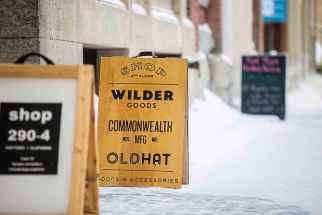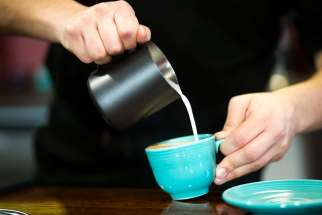Three’s company Trio of Exchange District businesses find multitude of benefits in joining the movement towards sharing manufacturing and retail space
Read this article for free:
or
Already have an account? Log in here »
To continue reading, please subscribe:
Monthly Digital Subscription
$0 for the first 4 weeks*
- Enjoy unlimited reading on winnipegfreepress.com
- Read the E-Edition, our digital replica newspaper
- Access News Break, our award-winning app
- Play interactive puzzles
*No charge for 4 weeks then price increases to the regular rate of $19.00 plus GST every four weeks. Offer available to new and qualified returning subscribers only. Cancel any time.
Monthly Digital Subscription
$4.75/week*
- Enjoy unlimited reading on winnipegfreepress.com
- Read the E-Edition, our digital replica newspaper
- Access News Break, our award-winning app
- Play interactive puzzles
*Billed as $19 plus GST every four weeks. Cancel any time.
To continue reading, please subscribe:
Add Free Press access to your Brandon Sun subscription for only an additional
$1 for the first 4 weeks*
*Your next subscription payment will increase by $1.00 and you will be charged $16.99 plus GST for four weeks. After four weeks, your payment will increase to $23.99 plus GST every four weeks.
Read unlimited articles for free today:
or
Already have an account? Log in here »
Hey there, time traveller!
This article was published 13/02/2019 (2496 days ago), so information in it may no longer be current.
By now, most Winnipeggers are familiar with pop-up markets, the sort that feature a mix of independent business-types gathered as one to peddle their individual wares for a day or two at a predetermined location.
Lately, that business model has begun to take on a more permanent approach.
In January, it was announced a trio of food-oriented entrepreneurs, fellows who met while selling their products at various pop-ups throughout the city, will be joining forces this spring when they collectively move into 941 Portage Ave., the former home of Jonnie’s Sticky Buns.
Also, when popular Osborne Village coffee shop Little Sister opened its second location at the corner of Osborne Street and Morley Avenue a few months ago, it did so in cahoots with two other enterprises, trendy clothing biz Tony Chestnut and full-service salon Spruced Hair Design.
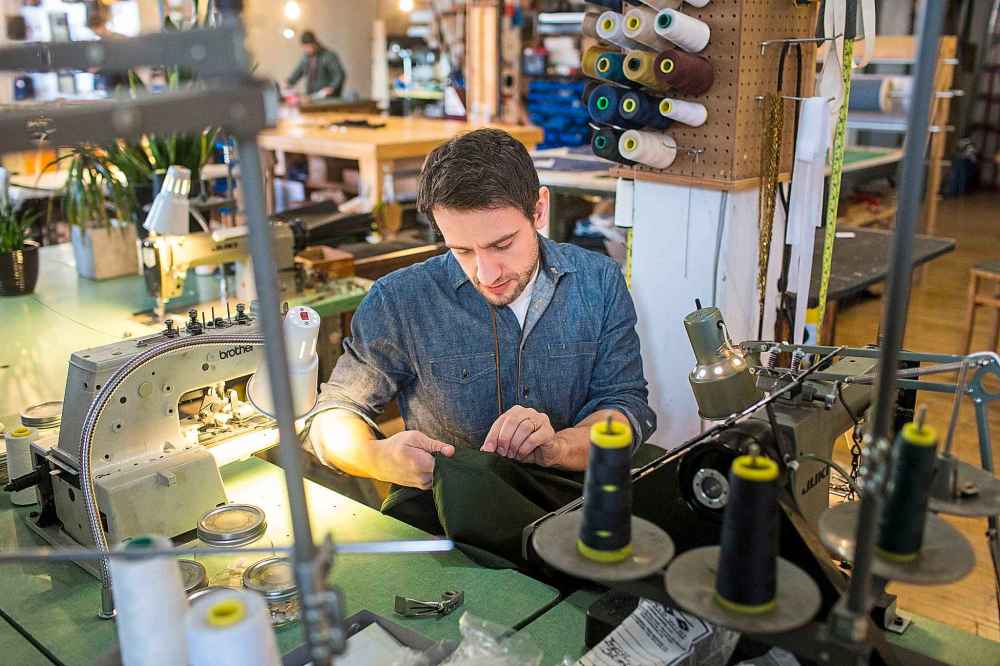
“One reason I think you’re seeing this happen more and more is because Winnipeg is a bit of a sprawly city where it’s often difficult for small makers like us to find somewhere that’s both affordable and the right size. So it’s a definite plus if there’s one or two others to help out with the bills and stuff,” says Andrew Doerksen, founder of Commonwealth Manufacturing, a four-year-old company specializing in timelessly stylish men’s and women’s shirts.
Since January 2017, Doerksen’s operation has been based out of a 3,000-square-foot, combined retail and workshop space on the fourth floor of the Daylight Building, accessible through the Glengarry Block, 290 McDermot Ave.
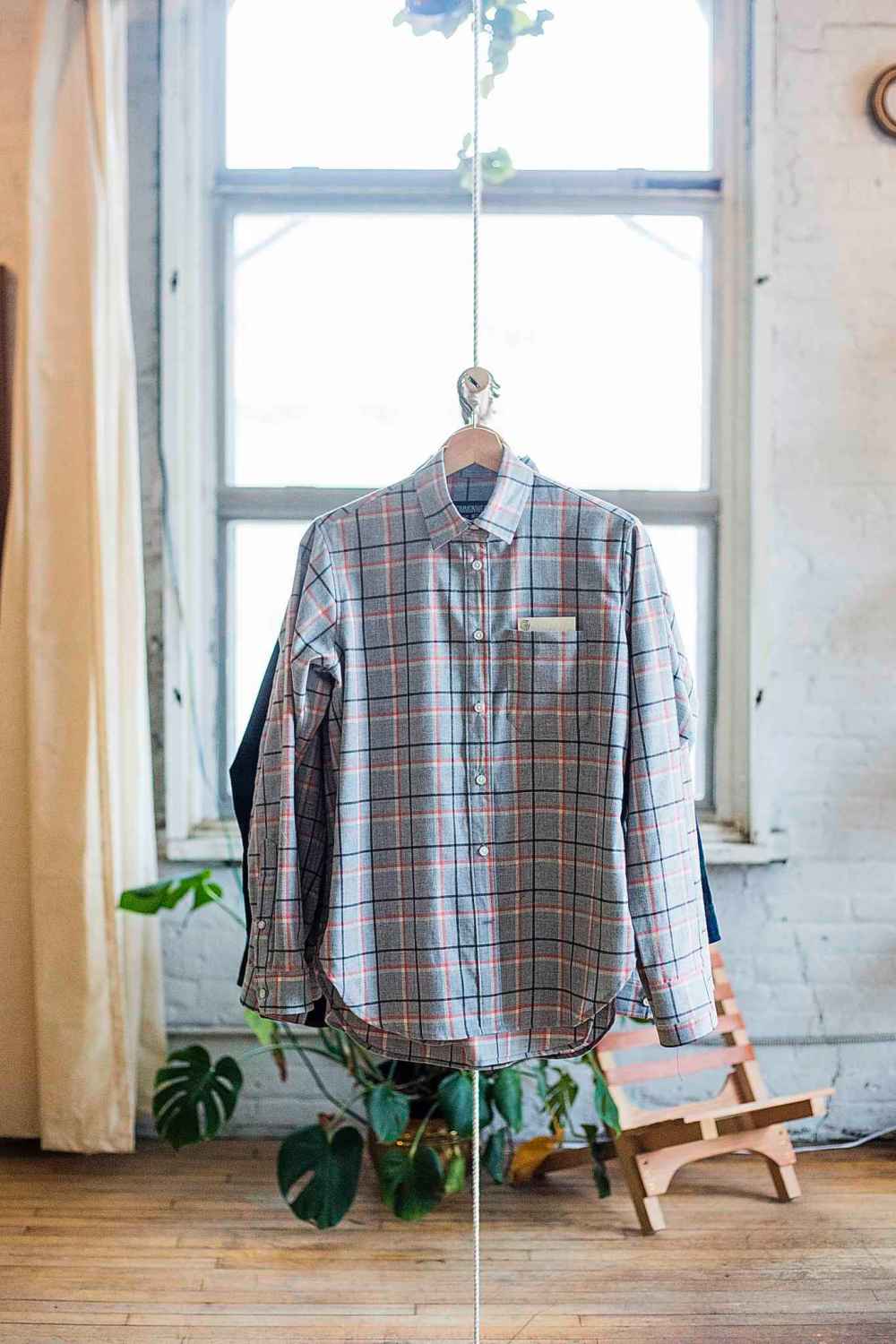
Sharing the rent are Nathan Dueck, owner of Oldhat, which specializes in fashionable headgear made from recycled material, and Brendon Friesen and Nathan Bezoplenko of Wilder Goods, which turns out eye-catching leather and canvas bags, totes and wallets.
The foursome recently renewed their lease for three years — a good measuring stick, they contend, of what strength in numbers can do for “the little guy.”
“What’s also good, besides being able to have a real, bona fide office Christmas party for the first time in our lives, is that people don’t seem as intimidated about taking the elevator up as they might be if there was just one of us here,” Bezoplenko points out, seated in the guys’ lounge area, an assortment of mismatched chairs and end tables they picked up from a nearby Goodwill outlet.
“Maybe they’re not interested in one of Nathan’s hats or my and Brendon’s bags. But then they’ll spot Andrew’s shirts and decide to stick around a bit longer.”
===
In the summer of 2016, Dueck was chatting with a pair of women, friends of his who ran a ceramics studio in the Exchange District. They mentioned there was plenty of vacant space available in their building, which piqued the curiousity of the self-taught hat maker.
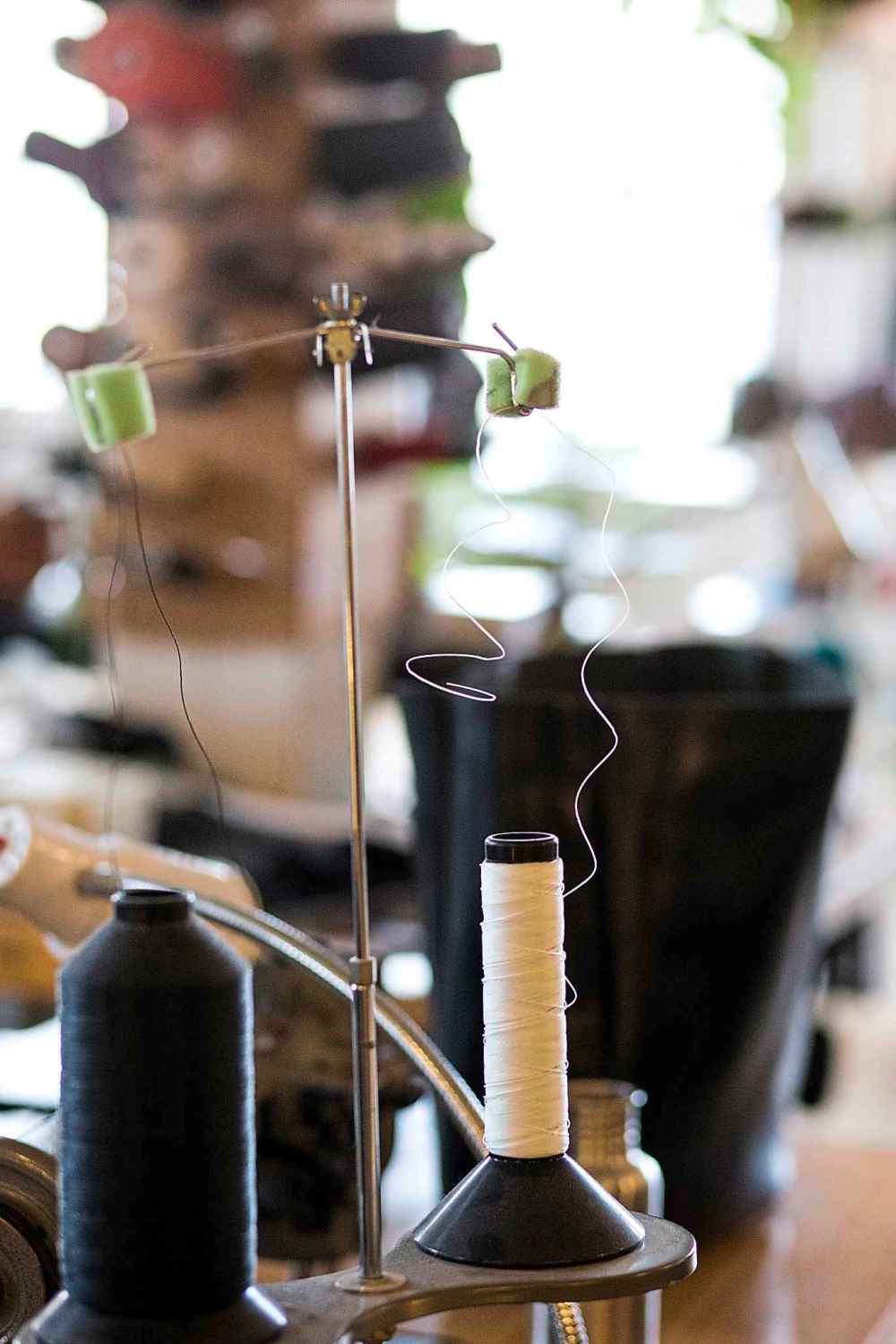
Dueck, a married father of one, wasn’t a dad yet. But because he and his wife Chloe Bishop had already seriously discussed starting a family, he knew he would eventually have to vacate the spare bedroom in their West End home where, for close to a decade, he’d been crafting his line of hand-sewn hats and caps.
“I came down to have a look. I thought it was perfect but knew the only way I could afford to move here was if I could split the costs with a couple other people,” he says.
“Brendon and I had known each other for years, we both grew up in the country, and through him I’d also gotten to know his housemates Nathan and Andrew. In the fall of 2016 I proposed the idea of us coming here together. Everybody was like, ‘Great idea, let’s do it.’”
Although their regular clientele has gotten used to their open concept — approximately 15 per cent of the floor-space is devoted to their retail component, while the rest is reserved for production — first-time visitors are sometimes confused where it’s OK to set foot versus where it’s not.
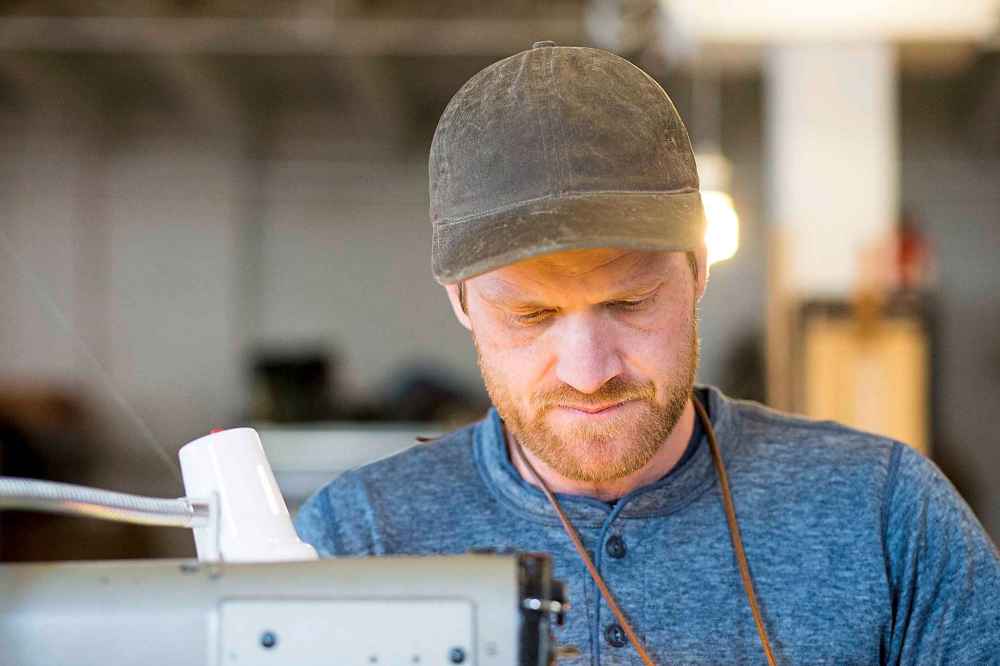
“We don’t have our sewing or cutting areas roped off or anything so yeah, from time to time people will take a wrong turn and end up wandering past our machines, while we’re busily chugging away,” Bezoplenko says, pointing out a well-used Ping-Pong table near the back of the room where they habitually hold impromptu tournaments during their “2 p.m. crash time.”
“It’s a bit of a crazy set-up in here, part store, part warehouse,” Friesen adds, “so I get why they might get mixed up. But what’s nice is they’re fully able to watch us work if they want to. If they have any questions about the process, we’re only too happy to explain things.”
Dueck says besides the obvious financial benefits, there are other positives associated with their all-for-one-and-one-for-all strategy. First of all they can stagger their hours, so nobody’s stuck working every weekend. (Their store, which Doerksen jokingly refers to as Oldwildwealth, is open 10 a.m. to 5 p.m., Monday to Friday, and 10 a.m. to 4 p.m. Saturdays.)
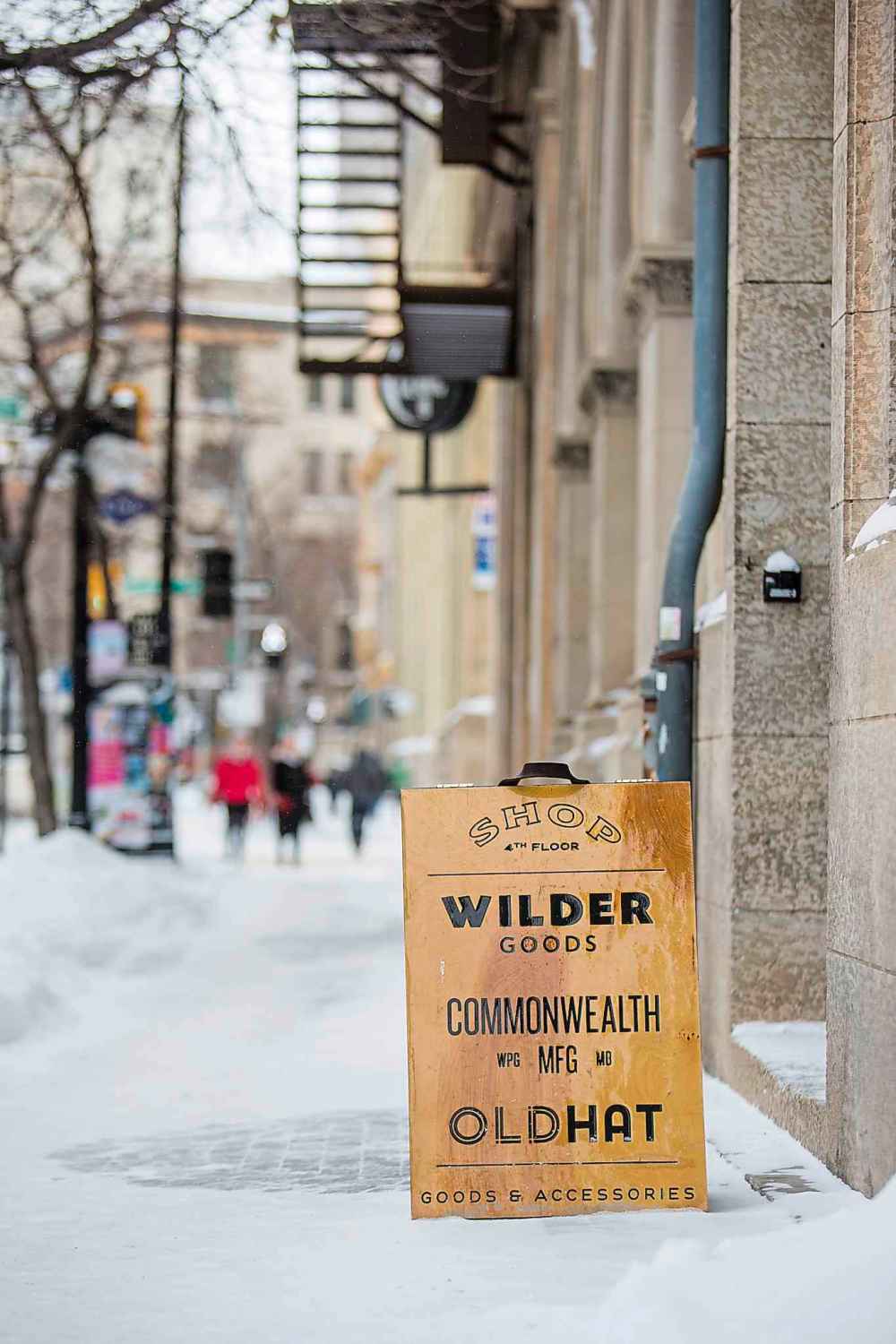
“There’s a lot of freedom, hours-wise, because in truth, you only need one person up here in order for it to work,” Dueck says. Also, when somebody gets stuck on a particular design or stitch, there are three other brains to pick.
“Very seldom would you hear one of us telling the other what they can do to make something they’re working on better, but if any of us need help with anything, we always know who to ask,” he says, speaking loud enough to be heard over a sudden bang-bang-bang emanating from the floor above, home to a furniture re-upholsterer.
And although the quartet hope to call 290 McDermot Ave. home for years to come, each of them fully intends to continue attending as many pop-up markets, where they all got their start, as time will allow.
“What’s good about the markets, I think, is they help set the standards and raise the bar, so to speak,” Friesen says.
“There we are, all in one room, admiring each other’s stuff and going, wow, I better pick up my game. Just like working side-by-side with the guys here, it’s a healthy competition that in my belief results in better quality products for the consumer.”
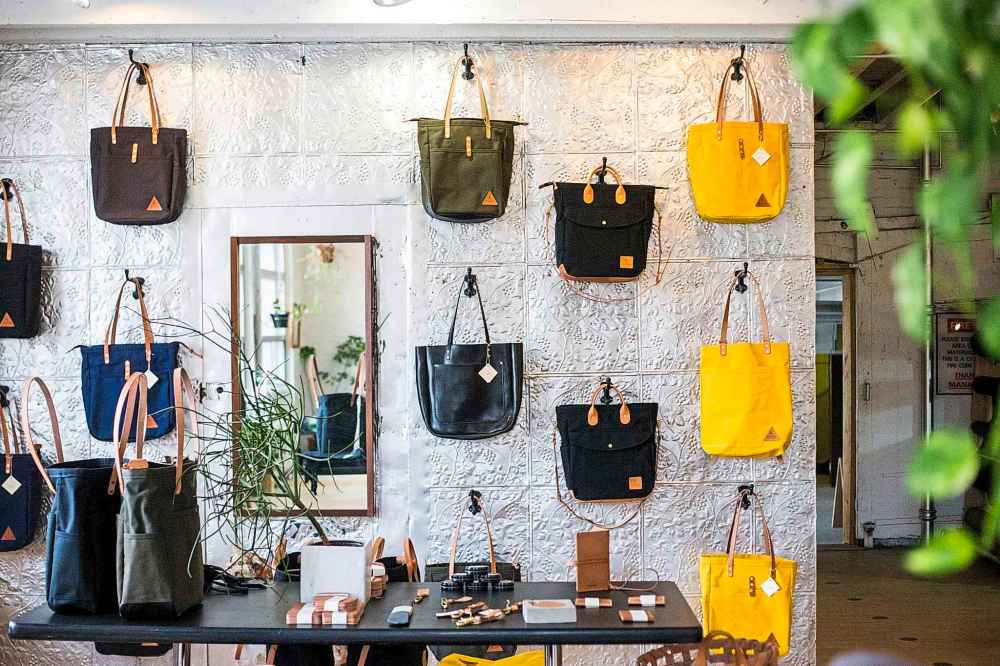
“The thing is, we’re all small businesses and it’s not like we’re competing against one another,” Bezoplenko pipes in.
“It’s more like we’re competing against the bigger brands or the malls or whatever the alternative is. In this room, we definitely have more in common with each other than we do the big conglomerates.”
david.sanderson@freepress.mb.ca
Origin stor(ies)
Oldhat
In 2006, Nathan Dueck received a military-style ball cap as a birthday gift. He liked the style, but not the fit.
Instead of returning it, however, he used it as a template, making a similarly styled hat out of a pair of trousers he no longer had any use for.
The moment he began wearing his new lid around the University of Manitoba campus, where he was studying engineering, people began tapping him on the shoulder, asking, “Where did you get your hat? I want one, too.”
In January 2015, Dueck resigned from his engineering job to devote his full attention to his line of men’s and women’s hats. His mantra from the get-go has been to use recycled material only — everything from end-of-the-roll upholstery fabric to old drapes to second-hand suits and dresses. Hence the tag Oldhat.
Commonwealth Manufacturing
Eight years ago, with nothing suitable to wear to his new job at Parlour Coffee, Andrew Doerksen went shopping at Value Village. Sure, he found a few button-up shirts he liked, but either the collar was too flappy or the arms were too long.
Despite the fact he hadn’t been near a serger since junior high, back when he “absolutely sucked at home ec,” he bought a sewing machine on Kijiji for $20 and got busy, altering his finds.
After fielding a slew of compliments on his “new” wardrobe, he thought, “This is fun; maybe I can learn to make shirts from scratch.”
Wilder Goods
In 2011, Brendon Friesen, on a whim, made a leather carrying case for his laptop. The bag wasn’t perfect, he says, but it was functional enough he and Nathan Bezoplenko, his pal and housemate, began discussing ideas for other projects.
They eventually settled on totes and backpacks because, according to the two of them, “people have a special connection to the bags they travel the world with, and we thought it would be pretty cool to be a part of those experiences.”
After getting their start at a tiny studio on Albert Street, they relocated to Sherbrook Street two years later, renting space in the back half of Thom Bargen Coffee & Tea.
“That was a good set-up because it allowed us to chat with people coming in for coffee, get some great feedback and a feel for what people in general are interested in, bag-wise,” Bezoplenko says.
Dave Sanderson was born in Regina but please, don’t hold that against him.
Our newsroom depends on a growing audience of readers to power our journalism. If you are not a paid reader, please consider becoming a subscriber.
Our newsroom depends on its audience of readers to power our journalism. Thank you for your support.




